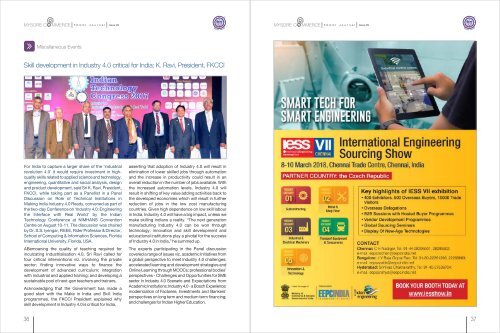You also want an ePaper? Increase the reach of your titles
YUMPU automatically turns print PDFs into web optimized ePapers that Google loves.
MYSORE C MMERCE F K C C I J o u r n a l Issue 09<br />
MYSORE C MMERCE F K C C I J o u r n a l Issue 09<br />
Miscellaneous Events<br />
Skill development in Industry 4.0 critical for India: K. Ravi, President, <strong>FKCCI</strong><br />
For India to capture a larger share of the ‘industrial<br />
revolution 4.0’ it would require investment in highquality<br />
skills related to applied science and technology,<br />
engineering, quantitative and social analysis, design<br />
and product development, said Sri K. Ravi, President,<br />
<strong>FKCCI</strong>, while taking part as a Panellist in a Panel<br />
Discussion on Role of Technical Institutions in<br />
Making India Industry 4.0 Ready, convened as part of<br />
the two-day Conference on ‘Industry 4.0: Engineering<br />
the Interface with Real World’ by the Indian<br />
Technology Conference at NIMHANS Convention<br />
Centre on August 10-11. The discussion was chaired<br />
by Dr. S.S. Iyengar, FIEEE, Rider Professor & Director,<br />
School of Computing & Information Sciences, Florida<br />
International University, Florida, USA.<br />
ABemoaning the quality of teaching required for<br />
inculcating Industrialisation 4.0, Sri Ravi called for<br />
four critical interventions viz. involving the private<br />
sector; finding innovative ways to finance the<br />
development of advanced curriculum; integration<br />
with industrial and applied training; and developing a<br />
sustainable pool of next-gen teachers and trainers.<br />
Acknowledging that the Government has made a<br />
good start with the Make in India and Skill India<br />
programmes, the <strong>FKCCI</strong> President explained why<br />
skill development in Industry 4.0 is critical for India,<br />
asserting that adoption of Industry 4.0 will result in<br />
elimination of lower skilled jobs through automation<br />
and the increase in productivity could result in an<br />
overall reduction in the number of jobs available. With<br />
the increased automation levels, Industry 4.0 will<br />
result in shifting of key value adding activities back to<br />
the developed economies which will result in further<br />
reduction of jobs in the low cost manufacturing<br />
countries. Given high dependence on low skill labour<br />
in India, Industry 4.0 will have a big impact, unless we<br />
make skilling Indians a reality. “The next generation<br />
manufacturing Industry 4.0 can be won through<br />
technology, innovation and skill development and<br />
educational institutions play a pivotal for the success<br />
of Industry 4.0 in India,” he summed up.<br />
The experts participating in the Panel discussion<br />
covered a range of issues viz. academic Initiatives from<br />
a global perspective to meet Industry 4.0 challenges;<br />
accelerated learning and development strategies and<br />
Online Learning through MOOCs; professional bodies’<br />
perspectives - Challenges and Opportunities for SME<br />
sector in Industry 4.0 Scenario and Expectations from<br />
AcademicInstitutions;Industry4.0-aBosch Experience;<br />
modernization of Factories, Investments and Bankers’<br />
perspectives on long term and medium term financing;<br />
and challenges for Indian Higher Education.<br />
36<br />
37



